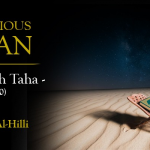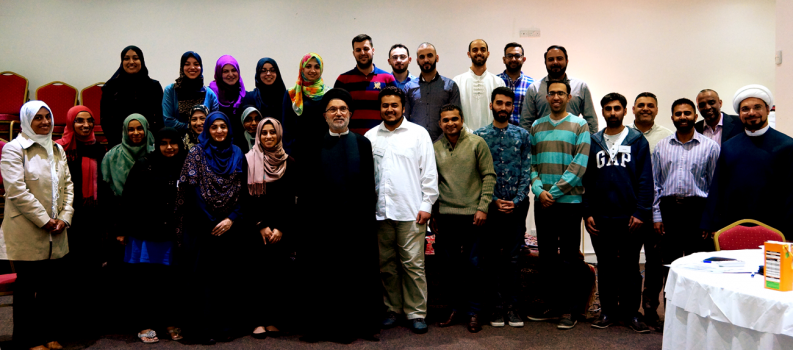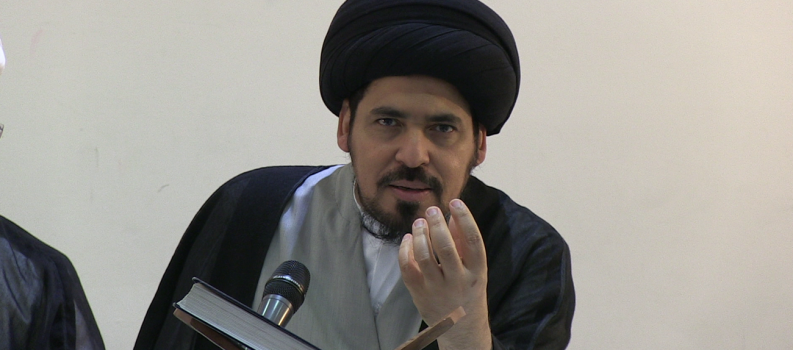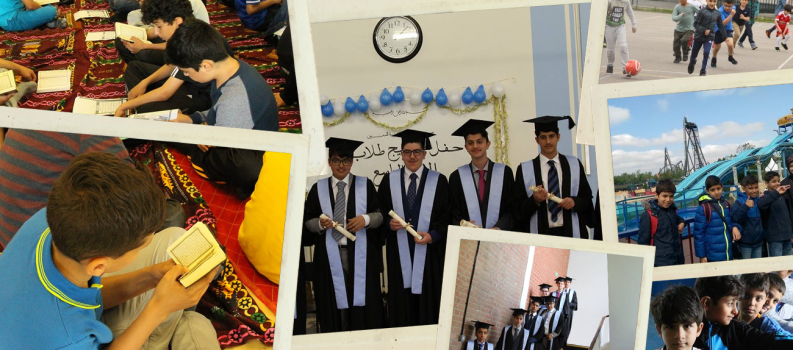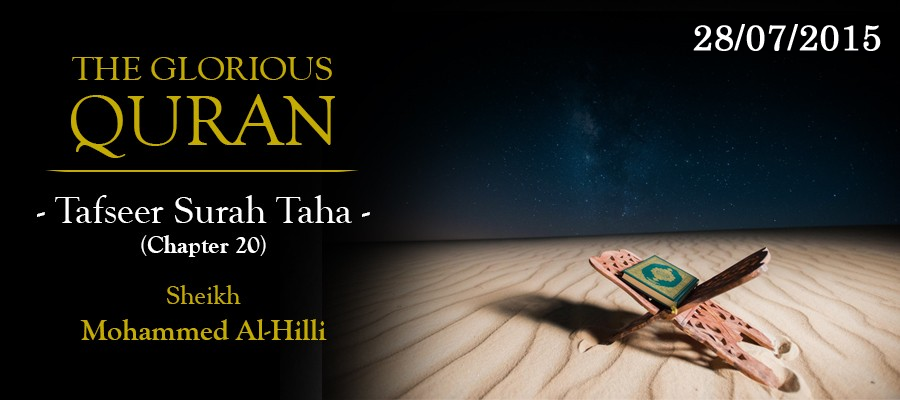
Shaykh Mohammed al-Hilli’s weekly tafsīr returned this week after its brief hiatus during the holy month of Ramadhan, continuing the exegesis of twentieth chapter of the Qur’an, Sūrat Ṭā Hā. Shaykh Mohammed began with a summary of what had been covered so far.
We recalled that the chapter begins by talking about the might and majesty of God, His omnipotence and omniscience, before moving on to talk about the story of Prophet Moses. Shaykh Mohammed took this opportunity to remind us that that Moses is mentioned by name 136 times in the Qur’an and as such we are invited to pay particular attention to his story. Though Moses’s story is mentioned a number of times in the Qur’an, this particular narration begins with Moses’s encounter with the Burning Bush in the sanctified valley of Ṭuwā. There God commands Moses to confront Pharaoh over his transgressions, and in response Moses asks for four things from God.
The first is for God to expand his chest, by which we are given to understand that Moses wants God to give him patience and steadfastness. Second he asks God to ease his task for him; it’s important to note here that the Arabic is “yassir lī ‘amrī – make my task easy for me” (20:26, my emphasis). Moses is not asking for the task itself to be an easy one, but rather is asking for God to give him the ability to deal with it in the best way he can. The third thing he requests is for God to untie the knot from his tongue, by which he means give him the gift of eloquence, and finally he asks that God appoint his brother Aaron to help him in his mission. This last request deserves particular attention. Moses asks that God make Aaron a partner in his task – “’ašrikhu fī ‘amrī” (20:32) – therefore asking that God allow Aaron to share in his knowledge and his responsibility, so that they may increase the praise and remembrance of God. We now remember the well-known, authentic and unanimously accepted hadith from Prophet Muhammed (s) about Imam Ali (a) in which he says: “Ali is to me as Aaron was to Moses, except that there will be no prophet after me.” From this we can understand that Imam Ali shared in Prophet Muhammed’s responsibility, not to mediate revelation, but to guide mankind and increase the praise and remembrance of God.
God grants Moses his requests, commenting that this isn’t the first time He has granted him bounties, and with this verse we pick up our tafsīr: “walaqad manannā `alayka marratan ‘uxrā – and We have already bestowed favour on you another time” (20:37). Shaykh Mohammed drew our attention to the word “manannā – we have bestowed favour”, commenting that many times Muslims feel that it’s enough for them just to be Muslims, as if by being Muslims they are doing God a favour. This sentiment, with the same verb “mann”, is expressed in Sūrat Ḥujurāt: “yamunnūn `alayka ‘an ‘aslamū, qul lā tamunnū `alayya ‘islāmakum, bal Allahu yamunnu `alaykum ‘an hadākum lil-‘īmāni ‘in kuntum ṣādiqīn – they consider it a favour to you [oh Prophet] that they have accepted Islam; say: “Don’t consider your Islam a favour to me – rather God has bestowed a favour upon you, guiding you to faith, if you are truthful.” (49:17). It is not enough for us simply to be Muslims, and we shouldn’t imagine that by being Muslims we are condescending to acquiesce to God’s and Prophet Muhammed’s wishes. Instead, Islam is a bounty to us from God, giving us the opportunity to live better lives, and we should allow it to have a significant effect on our actions and our characters.
So, to return to Sūrat Ṭā Hā, having granted Moses his requests, God tells him of the favours He has bestowed upon him. He talks about what he revealed to Moses’s mother, saying: “awḥaynā ‘ilā ‘ummika mā yūḥā – We revealed to your mother what was revealed” (20:38). The use of “mā yūḥā – what was revealed” implies that God revealed to Moses’s mother only that which needed to be revealed, in a complete and concise manner. God is referring here to how He protected Moses when he was a baby, and we recalled the story of his birth and his miraculous deliverance from death.
When Pharaoh became aware that a child would be born from amongst the Israelites who would bring about his downfall he ordered that all the new-born Israelite boys should be slaughtered. He was advised, however, that this would lead to a dramatic dearth in the Egyptian access to slave labour, so he decided instead to have the new-borns killed in one year, and not in the next. Aaron was born in the year when the children were not slaughtered, three years before Moses, and we should point out that he also died three years before Moses. Moses, on the other hand, was born in the year when the new-born Israelite boys were being slaughtered. However, God protected Moses – when his mother was carrying him she showed no signs of pregnancy, and when he was born God commanded her to place him in a casket and place the casket in the river, and He commanded the river to carry him safely to the riverbank where he was found by Pharaoh and his wife. Here God says: “ya’xuδhu `aduwwun lī wa`aduwwun lah – one will take him who is an enemy to Me and an enemy to him” (20:39). Here God repeats the word “`adū – enemy” to emphasise the fact that He is on Moses’s side, that Moses’s enemy is God’s enemy. We should remember that God is telling Moses what He told his mother, and that this conversation is still taking place in the valley of Ṭuwā – God is instilling Moses with confidence (or, as we could say, expanding his chest), having just given him the task of confronting Pharaoh.
After this God says to Moses: “wa’alqaytu `alayka maḥabbatan minnī walituṣna`a `alā `aynī – and I bestowed on you a love from Me so that you may be brought up under my eye” (20:39). We must be careful here and point out that God says “a love from me” and we are to understand from this that, because of Moses’s piety and righteousness, God inspired love for him in the hearts of those around him. This corresponds to a verse in Sūrat Maryam in which we are told: “’inna alleδīna ‘āmanū wa`amilu al-ṣāliḥāti sayaj`alu lahum al-raḥmānu wuddā – those who believe and perform righteous acts, the Merciful will appoint for them affection” (19:97). Similarly in Sūrat Ibrāhīm, Abraham asks God for his descendants: “faj`al ‘af’idatan min al-nāsi tahwī ‘ilayhim – make people’s hearts incline towards them”(14:37). The opinion of many of the scholars is that Abraham is not referring only to his immediate descendants, but also to Ahl al-Bayt (the inheritors of his creed). There are surely many accounts of how people, even from amongst their enemies, when they were in the company of Ahl al-Bayt were overcome by a strong feeling of contentment and admiration. Likewise, this kind of divinely inspired love can be seen in the life of Moses. Pharaoh had appointed midwives to inform the authorities whenever an Israelite boy was born so that he could be killed, but the midwife in attendance to Moses’s mother felt an overwhelming sense of affection for him and kept his birth a secret. Similarly, when Pharaoh found Moses on the bank of the river, his wife Asiya (who herself was a pious and believing woman) convinced him to keep the baby and raise him as their son.
Another of the favours God tells Moses He has given him is that He reunited him with his mother when he was a baby. This is a reference to the story that, when Moses was a baby, he would not be breastfed by anyone, and it was then his sister who suggests that their mother could act as a wetnurse for the baby Moses, saying; “hal ‘adullukum `alā man yakfuluh – shall I direct you to someone who will support him?” (20:40). As such Moses was suckled by his own mother, even though he was brought up in the family of Pharaoh, the fact that they were mother and son remaining secret. Pharaoh’s suspicions were naturally raised when he saw how well the woman and baby got on together, but Moses’s mother defended herself by saying she was good with children and that her milk was sweet. Pharaoh never realised that his surrogate son was an Israelite, let alone that he would be the one to bring about Pharaoh’s destruction – after all, Moses was protected by God, brought up under God’s eye.
After this God refers to an event that has been the subject of much controversy amongst scholars. He says: “waqatalta nafsan fanajjaynāka min al-ġammi wafatannāka futūnā – and you killed someone, but We saved you from retaliation, and tried you with a trial” (20:40). This story is also mentioned in Sūrat al-Qaṣaṣ, in which we are told that Moses intervened in a fight between one of his followers and one of his enemies, struck the one who was from his enemies, and killed him. Having killed the man, Moses says: “hāδa min `amali al-šayṭān – this is from the work of the Devil” (28:15) and “’innī ẓalamtu nafsī – I have wronged myself” (28:16). This issue of Moses having killed someone, and of possibly having done wrong, puts a question mark over the idea of the infallibility of the prophets and requires stringent investigation. Shaykh Mohammed will continue the discussion and focus on this particular question next week, insha’allah.


